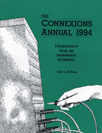
Connexions Annual 1994
A Sourcebook of Social and Environmental Alternatives
Diemer, Ulli (ed.)
http://www.connexions.org/CxDigest/CXDGT55.pdf
Publisher: Connexions Information Sharing Services, Toronto, Canada
Year Published: 1994
Pages: 224pp Price: $30 ISBN: 0-9692751-2-9
Resource Type: Serial Publication (Periodical)
Cx Number: 55
Simultaneously a reference book and an introduction to the world of social and environmental alternatives. The bulk of the Annual is devoted to listings of grassroots groups. It also contains a series of introductory articles surveying a wide range of social and environmental issues and possibile alternatives.
Abstract:
The Connexions Annual is simultaneously a reference book and an introduction to the world of social and environmental alternatives. The bulk of the Annual is devoted to listings of grassroots groups. The listings are grouped under 13 main chapters including Community/Urban/Housing, Development/International, Native Peoples, Peace, and Women. There are separate listings of Alternative Periodicals and "Useful Sources of Information". The listings are thoroughly cross-indexed, by name, by geographical location, and by subject. The Annual is a useful resource for those active in working for change, as well as for those wanting to become involved. The Annual also contains a series of introductory articles surveying a wide range of social and environmental issues and possibile alternatives. These introductory articles when read together become an extended essay on the possibility of achieving meaningful social and environmental change.
Introduction to the 1994 issue:
A coal miner who took part in the wave of strikes which shook the former Soviet Union summed up the problems facing his local strike committee as follows: "We have to answer two simple questions: ‘How are we going to live?’ and ‘What do we do now?’”
Those are questions we all have to answer. We live in a world in crisis. Governments, corporations, and institutions assure us they have everything under control, and that better times are just around the corner, but all around us we see poverty, violence, injustice, environmental disasters, and wars.
For more than a decade, they have imposed a new-right agenda on our societies, telling us we have no choice but to adapt to a ‘new world order’ based on ‘free markets’ and privatization. Instead of experiencing the promised benefits, however, most of us find ourselves worse off, economically, socially, and spiritually.
Most of us are not living the lives we would choose to live, but the existing order insists there are no alternatives to itself, and most of us are sufficiently convinced or pre-occupied or discouraged to keep society from coming unglued. Many, many people wish there were alternatives, or think there ought to be, but are resigned to the conclusion that it is utopian to entertain any hopes for real change. The ‘system’ is too big, too powerful, and we are too weak and too few in numbers.
‘What do we do now?’ ‘How do we live?’ All too often, we mind our own problems and don’t think about the rest.
Yet despite the pervasive feeling that ‘nothing can be done’, people do join together to act in common when they feel threatened or wronged, or when they have a goal in sight which they desire passionately enough. Sometimes they organize quietly and gradually. At other times a mass movement explodes into being, seemingly out of nothing, despite the risks and the odds.
This Annual is dedicated to the idea that change is both necessary and possible. Its main intent is practical: to provide information about groups across Canada who are working at society’s grassroots to create positive solutions to social, environmental, economic, and international problems.
We hope that by providing this information we will be making it easier for those already active to find out about and contact each other and to do their work more effectively and co-operatively. We hope that those individuals who are thinking about or looking for ways to become active will be able to use the information to find like-minded people to work with.
We hope, too, that this book will help to get out the message that there are viable alternatives to destructive and exploitative institutions and structures, and that there are people organizing to build those alternatives.
It is also a goal of this Annual to stimulate thinking about how we can work more effectively together toward our mutual goals, and how we can reach out to broaden our movements. If we can learn to do this well enough, we have the potential to create a much more powerful social movement, not only national but international in its scope, one that goes beyond single-issue organizing to work toward an integrated vision of a more just and caring world.
This does not necessarily mean that individual groups should be dissolving themselves into a large movement. But often the best thing we can do to help ourselves is to help someone else. By offering and extending solidarity to others, we establish bonds between us that give us strength too. Feelings and actions of solidarity can be a fruitful source of understanding, trust, and power, and that power is something that we too can draw on too.
Empowerment is a critical dimension of the process of change. We are seeking the power to create alternatives, and simultaneously we are seeking to dissolve the power structures that prevent us from doing so. We hope that this Annual will help to empower those working to create the alternatives.
Table of Contents:
How to Use This Book
Introduction
Arts, Media, Culture
Community, Urban, Housing
Development, International
Economy, Poverty, Work
Education, Children
Environment, Land Use, Rural
Health
Human Rights, Civil Liberties
Lesbians, Gays
Native Peoples
Peace
Women
Social Justice: General
Other Organizations of Interest
Alternative Periodicals
Resource and Reading List
Name Index
Geographical Index
Subject Index
Questionnaire
Advertisements
Subject Headings


